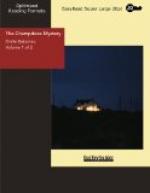“Ah,” murmured he, scarcely knowing the meaning of the words he uttered, “I had every confidence in you, and you have forgotten me.”
“You do not believe the words you have just spoken,” returned the Duchess haughtily; “but,” she added in softer accents, “what could I do? I may have been weak in obeying my father, but for all that I have never forgotten the past.”
Madame de Mussidan, who had stationed herself behind the closed door, caught every word, and a gleam of diabolical triumph flashed from her eyes. She felt sure that an interview which began in this manner would be certain to be repeated, and she was not in error. She soon saw that by some tacit understanding the Duchess and George contrived to meet constantly at her house, and this she carefully abstained from noticing. Things were working exactly as she desired and she waited, for she could well afford to do so, knowing that the impending crash could not long be delayed.
CHAPTER XV.
A Stab in the dark.
September had now arrived; and though the weather was very bad, the Duke de Champdoce, accompanied by his faithful old servant, Jean, left Paris on a visit to his training stables. Having had a serious difference with Diana, he had made up his mind to try whether a long absence on his part would not have the effect of reducing her to submission, and at the same time remembering the proverb, that “absence makes the heart grow fonder.”
He had already been away two whole days, and was growing extremely anxious at not having heard from Madame de Mussidan, when one evening, as he was returning from a late inspection of his stud, he was informed that there was a man waiting to see him. The man was a poor old fellow belonging to the place, who eked out a wretched subsistence by begging, and executing occasional commissions.
“Do you want me?” asked the Duke.
With a sly look, the man drew from his pocket a letter.
“This is for you,” muttered he.
“All right; give it to me, then.”
“I was told to give it to you only in private.”
“Never mind that; hand it over.”
“Well, if I must, I must.”
Norbert’s sole thought was that this letter must have come from Diana, and throwing the man a coin, hurried to a spot where it was light enough to read the missive. He did not, however, recognize Diana’s firm, bold hand on the envelope.
“Who the devil can this be from?” thought Norbert, as he tore open the outer covering. The paper within was soiled and greasy, and the handwriting was of the vilest description, it was full of bad spelling, and ran thus:—
“Sir,—




